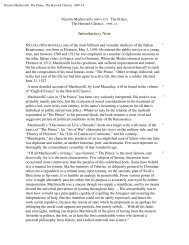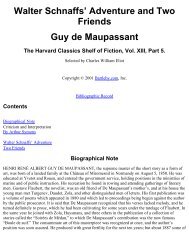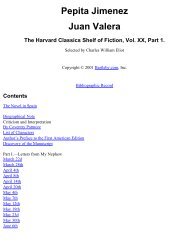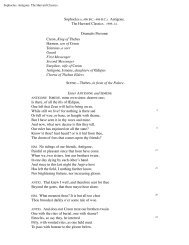Notre Dame de Paris - Bartleby.com
Notre Dame de Paris - Bartleby.com
Notre Dame de Paris - Bartleby.com
Create successful ePaper yourself
Turn your PDF publications into a flip-book with our unique Google optimized e-Paper software.
chapters of “Les Travailleurs <strong>de</strong> la Mer”; and the architecture and history of the middle ages intru<strong>de</strong> in<br />
“<strong>Notre</strong> <strong>Dame</strong>” far beyond what is necessary to give the required color and atmosphere. As a work of art<br />
this novel would only be improved by the omission of the chapters on the topography of <strong>Paris</strong> and the<br />
architecture of the cathedral. Yet it cannot be <strong>de</strong>nied that in “<strong>Notre</strong> <strong>Dame</strong>” he has written a story of<br />
tremendous force and enthralling interest. Once started it carries the rea<strong>de</strong>r breathlessly on; and it<br />
abounds in scenes that stamp themselves on the imagination and in figures that haunt the memory.<br />
Victor Hugo’s great lack was the sense of measure and proportion—a lack of which appears equally in<br />
his tremendously exaggerated sense of his own importance as a thinker, and in the absence of restraint<br />
and of humor in his writing. For he was not in the first rank in point of intellectual power. Neither in<br />
politics nor in literary movements did he really lead: the new i<strong>de</strong>a had always ma<strong>de</strong> some headway<br />
before he adopted it; and the theories of social regeneration which he took so seriously have left little<br />
permanent mark. Yet he had a colossal imagination and a style of vast range and power, and by means of<br />
these he is likely always to rank high among the writers who can stir men’s souls.<br />
Criticisms and Interpretations<br />
I. By Frank T. Marzials<br />
W. A. N.<br />
A GREAT book, a magnificent book most unquestionably, a book before which the critic may fitly throw<br />
down all his small artillery of carpings and quibblings, and stand disarmed and reverent. That Victor<br />
Hugo had realised his ambition of crowning with poetry the prose of Sir Walter Scott, I shall not affirm.<br />
But then it scarcely seems as if any such crowning were nee<strong>de</strong>d, or possible; for the good Sir Walter’s<br />
faults lay neither in lack of imagination, nor lack of fervour, nor an absence of elevation of tone, nor, in<br />
short, in a <strong>de</strong>ficiency of aught that goes to the making of poetry. “Quentin Durward” <strong>de</strong>als with the same<br />
period as “<strong>Notre</strong> <strong>Dame</strong> <strong>de</strong> <strong>Paris</strong>,” and if one places the two books si<strong>de</strong> by si<strong>de</strong> in one’s thoughts, such<br />
differences as there are will hardly seem to be differences in <strong>de</strong>gree of poetical inspiration. Our own<br />
great novelist’s work is fresher, healthier perhaps, more of the open air. A spirit of hopefulness and youth<br />
and high courage seems to circulate through his pages—a sort of pervading trust that the good things of<br />
this world <strong>com</strong>e to those who <strong>de</strong>serve them, that merit has its prizes, and unworthiness its punishments.<br />
There is blood enough and to spare in the book, and a good <strong>de</strong>al of hanging and much villainy. But our<br />
feelings are not greatly harrowed thereby. We need not weep unless so min<strong>de</strong>d. If a good tall fellow is<br />
lopped down here and there—like the worthy Gascon whom Dunois strikes through the unvisored<br />
face—the tragedy <strong>com</strong>es before we have known the man long enough to grow greatly interested in him.<br />
We are only affected as by the <strong>de</strong>ath of a very casual acquaintance. 1 And such sufferers as the Wild<br />
Boar of the Ar<strong>de</strong>nnes <strong>de</strong>serve their fate too thoroughly to cause us the most passing pang. So does Scott,<br />
in his genial kindliness, temper for us the horrors of the Middle Ages. He does not blink them, as M.<br />
Taine erroneously seems to hold. He presents them, with consummate art, so that they shall not cause<br />
unnecessary pain. Victor Hugo, in “<strong>Notre</strong> <strong>Dame</strong>,” was animated by a quite other spirit. After the manner<br />
of his nation—for French fiction tolerates an amount of unmerited misery to which the English rea<strong>de</strong>r<br />
would never submit—he looks upon life far more gloomily. Clau<strong>de</strong> Frollo may perhaps <strong>de</strong>serve even the<br />
appalling agony of those eternal moments during which he hangs suspen<strong>de</strong>d from the lea<strong>de</strong>n gutter at the<br />
top of the tower of <strong>Notre</strong> <strong>Dame</strong>, and has a hi<strong>de</strong>ous fore-taste of his imminent <strong>de</strong>ath. Quasimodo is at best<br />
but an animal with a turn for bell-ringing, and, apart from his <strong>de</strong>formity and <strong>de</strong>afness, not entitled to










